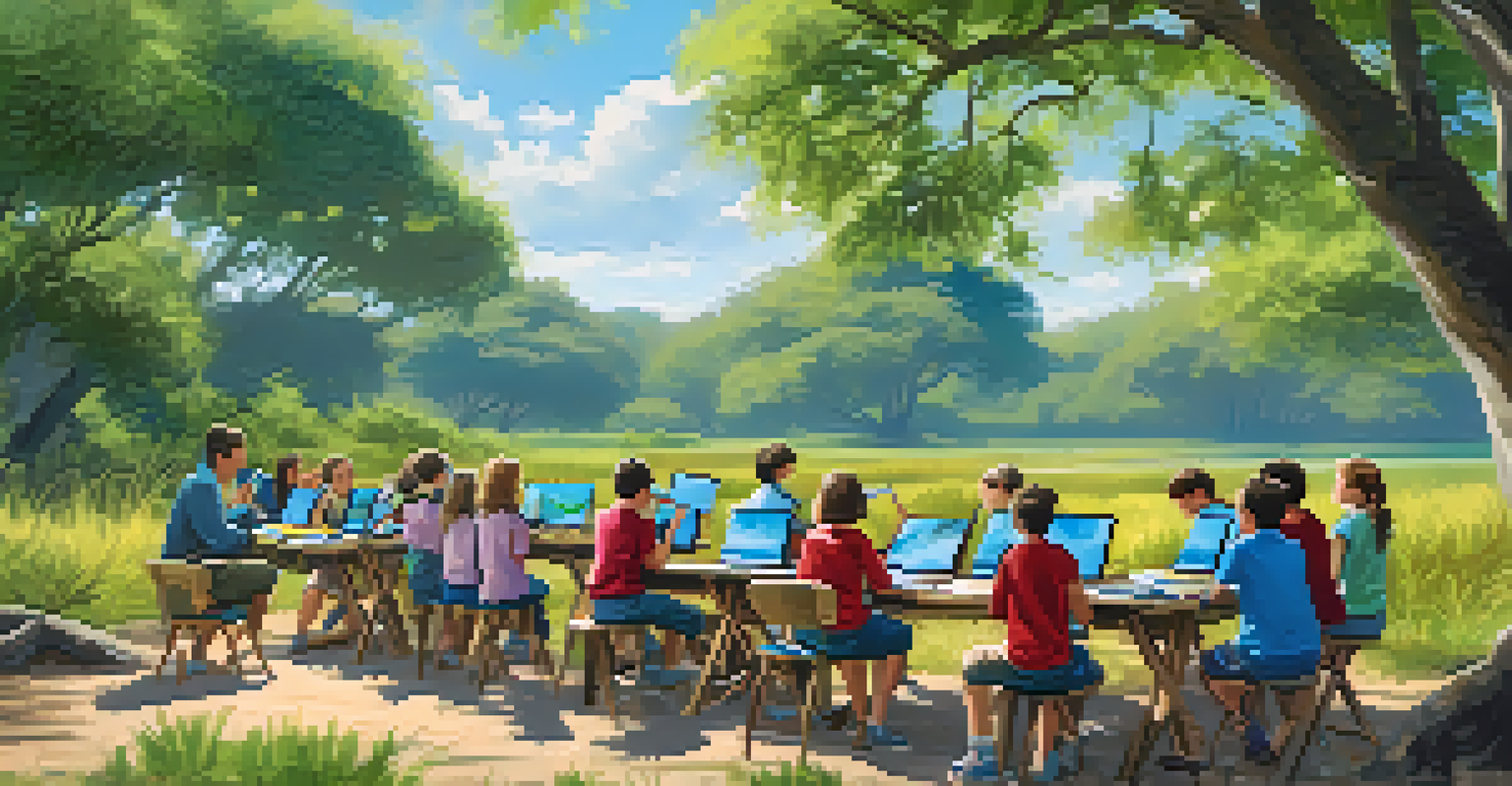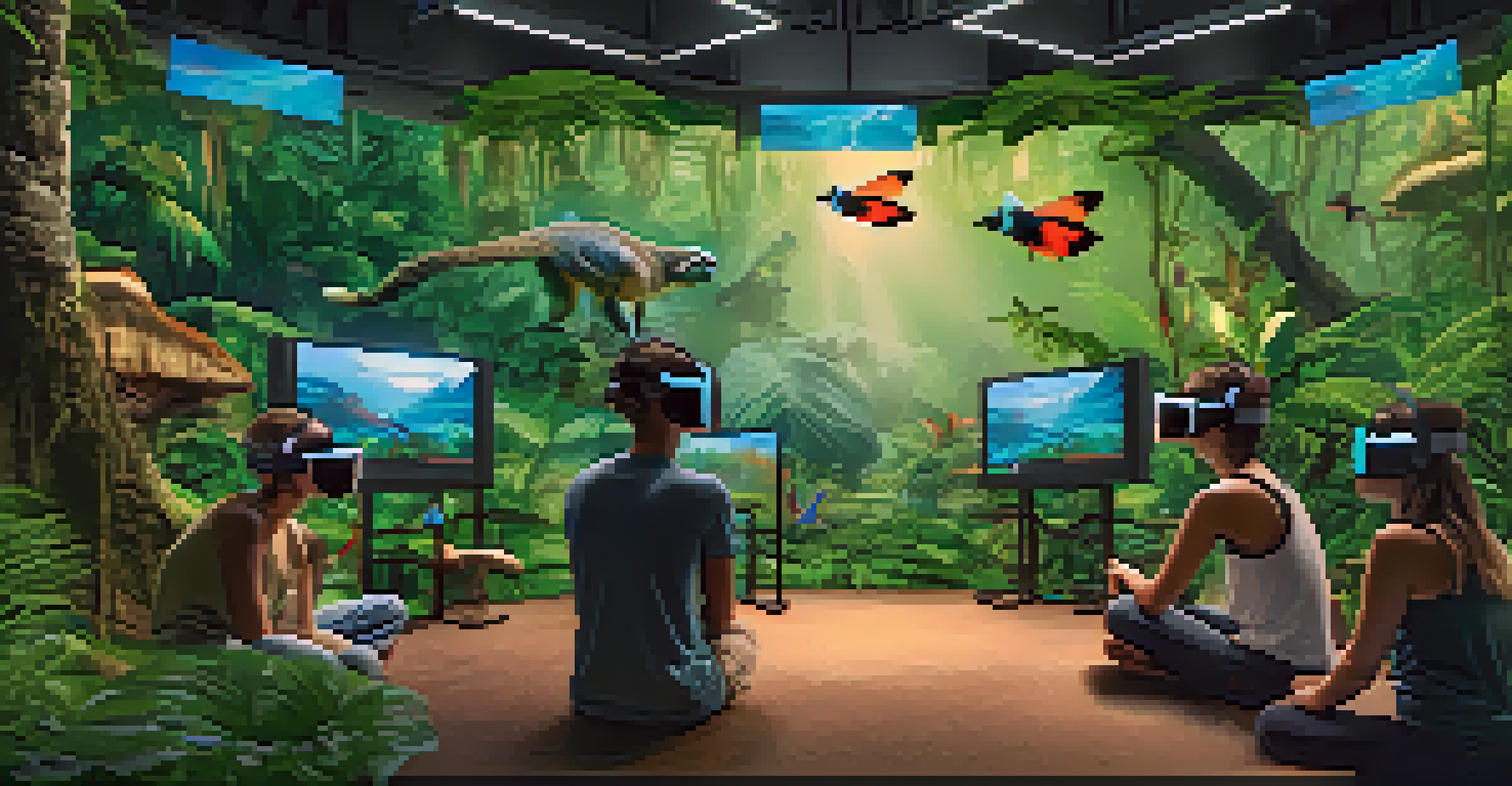Engaging Youth in Ecotourism: Educational Programs for All

Understanding Ecotourism and Its Importance
Ecotourism is a responsible travel approach that focuses on conserving the environment while promoting local cultures. It's not just about visiting beautiful places; it's about understanding and appreciating the delicate ecosystems we encounter. By engaging youth in ecotourism, we can nurture a generation that values sustainability and environmental stewardship.
The greatest threat to our planet is the belief that someone else will save it.
This form of tourism encourages young people to explore nature and learn about biodiversity, conservation efforts, and the impact of human activities on the planet. For instance, a trip to a national park can spark curiosity about wildlife conservation, leading to discussions about climate change and habitat preservation. These experiences can be transformative, instilling a lifelong passion for the natural world.
Moreover, ecotourism provides a unique platform for youth to engage with local communities, learning directly from those who rely on the land for their livelihoods. This connection fosters empathy and understanding, making them more aware of global challenges and the importance of protecting our planet.
The Role of Educational Programs in Ecotourism
Educational programs are essential in ecotourism as they help bridge the gap between travel and learning. These programs can range from guided nature walks to hands-on workshops, allowing young participants to engage actively with their surroundings. Through this immersive learning experience, they gain valuable insights into environmental issues while having fun.

For example, programs that involve wildlife monitoring enable students to collect data on local species, enhancing their understanding of ecology and conservation. Such activities not only educate but also empower youth to contribute to real-world solutions. The hands-on experience instills confidence and a sense of responsibility toward the environment.
Ecotourism Nurtures Future Stewards
Engaging youth in ecotourism fosters a deep appreciation for the environment and encourages sustainable practices.
Incorporating technology, like apps for identifying plants and animals, can make these educational programs even more engaging. By blending traditional learning with modern tools, we can captivate the younger generation, making their experience both informative and enjoyable. This approach helps them grasp complex ecological concepts in a relatable way.
Connecting Youth with Nature through Adventure
Adventure activities, such as hiking, kayaking, or zip-lining, are excellent ways to connect youth with nature. These exciting experiences not only thrill participants but also encourage them to appreciate the beauty of the environment. When young people are active in the outdoors, they are more likely to develop a deep-seated respect for nature.
The future will be shaped by your decisions today.
Imagine a group of teens hiking through lush forests, discovering diverse plants and animals along the way. As they navigate through different terrains, they learn about ecosystems, geology, and the importance of preserving these areas. This adventure creates lasting memories that deepen their love for the environment.
Moreover, these activities can foster teamwork and leadership skills. Working together to overcome challenges in nature encourages collaboration while building confidence in their abilities. This combination of physical activity and learning creates a holistic educational experience that resonates with youth.
Utilizing Technology to Enhance Learning Experiences
In today's digital age, technology plays a pivotal role in education, including ecotourism. Leveraging tools like virtual reality (VR) can transport youth to remote ecosystems, allowing them to explore without leaving their homes. This innovative approach can spark interest in ecotourism and environmental issues long before they step outside.
Additionally, online platforms can facilitate discussions and resources about various ecological topics. Young people can connect with experts, participate in webinars, and engage in interactive forums. This access to information empowers them to become informed advocates for the environment.
Educational Programs Empower Youth
Hands-on educational programs in ecotourism bridge travel and learning, equipping young people with vital environmental knowledge.
However, it's crucial to balance technology with real-world experiences. While digital tools can enhance learning, nothing compares to the firsthand experience of nature. By combining both, we can create well-rounded educational programs that keep youth engaged and informed.
Building Community Partnerships for Success
Successful ecotourism programs often rely on strong community partnerships. Collaborating with local organizations, schools, and environmental groups can enhance educational programs and broaden their reach. These partnerships provide essential resources, expertise, and support, ensuring that programs are effective and relevant to the community's needs.
For instance, a local wildlife reserve might partner with schools to offer educational tours and workshops. This collaboration not only benefits the students but also promotes the reserve's conservation efforts. The community feels a sense of ownership and pride, encouraging them to participate actively in protecting their natural resources.
Engaging local communities also allows for a more authentic learning experience. Youth can hear firsthand about the challenges and successes of conservation efforts from those directly involved. This connection fosters a deeper understanding of the issues at hand and inspires them to take action.
Promoting Sustainability Through Youth Engagement
Sustainability is at the heart of ecotourism, and engaging youth is crucial for its future. By educating young people about sustainable practices, we can instill values that lead to more responsible behaviors in their everyday lives. Simple actions, like reducing waste and conserving water, can have a significant impact when adopted by a generation.
Programs that emphasize the importance of sustainability help youth understand their role in preserving the environment. For example, teaching them about the effects of plastic pollution can motivate them to advocate for recycling initiatives at their schools. This sense of agency empowers them to make a difference in their communities.
Community Partnerships Enhance Impact
Collaborating with local organizations enriches ecotourism initiatives, creating authentic learning experiences for youth.
Moreover, fostering a culture of sustainability among youth can lead to innovative solutions for environmental challenges. Young minds are often bursting with creativity, and when encouraged to think critically about sustainability, they can develop fresh ideas and approaches to protect our planet.
The Lasting Impact of Ecotourism Education
The impact of engaging youth in ecotourism extends beyond their immediate experiences. The knowledge and skills they gain can shape their future careers and life choices. Many young people who participate in these programs go on to pursue environmental studies or careers in conservation, driven by their passion for the planet.
Additionally, these experiences can create a ripple effect within their communities. As they share their newfound knowledge and enthusiasm with peers and family, they inspire others to take an interest in environmental issues. This collective movement can lead to significant changes in community attitudes toward sustainability.

Ultimately, the goal of ecotourism education is to cultivate a generation of informed and passionate environmental stewards. By engaging youth today, we can ensure a brighter, more sustainable future for our planet. The lessons learned in ecotourism can empower them to become advocates for positive change, both locally and globally.